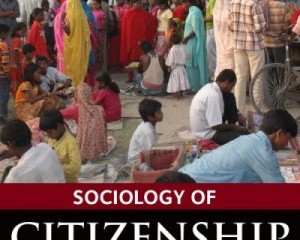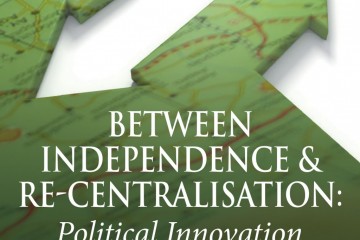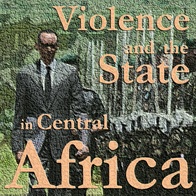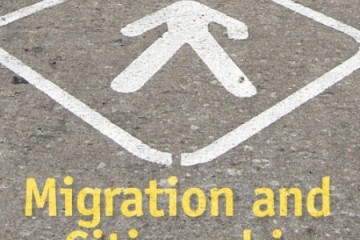
Afropolitanism: Global citizenship with African routes
Diasporas and other transnational communities have become particularly useful case studies for scholars interested in stretching and challenging mainstream conceptions of citizenship. It is now widely accepted that for many people around the world, physical location and formal legal citizenship may not be the most salient forms of social, political or economic affiliation. As the process of globalization continues to expand, more and more people find themselves in one place, while their lives are structured and oriented by connections to one or several other places. Some of these ‘places’ are other nation states, such as an ancestral country of origin. However, many such ‘places’ exist extraterritorially as abstract yet powerful expressions of identity, community, and belonging.
Enter Afropolitanism.
In 2005, Taiye Selasi authored a short piece for The Lip Magazine titled ‘Bye-Bye Babar (or: What is an Afropolitan?)’. In it, the British-born, American-raised, writer of Nigerian and Ghanaian origin, formulated a definition and vivid depiction of an ‘Afropolitan’, one that has become the reference point for many enthusiasts and critics alike.

Time is running out for the Transatlantic Trade and Investment Partnership
In 2013, the European Union and the United States launched negotiations for a comprehensive trade agreement (the Transatlantic Trade and Investment Partnership, TTIP). TTIP’s objective is to facilitate market access for goods and services across the Atlantic by cutting tariffs and trade restrictions (like the Buy American Act), harmonizing regulatory standards, and setting common trade rules, including on custom policies and protected geographical indications.
The agreement is negotiated in a difficult situation. Europe’s weight in the global economy is declining, whereas the US has recovered from the crisis and is striking a parallel deal with the ASEAN countries in the Far East.
Europe’s economic prosperity depends on trade more than that any other region’s in the world. International trade (import and export) accounts for 87% of EU GDP (against 30% in the US, and 50% in China). But what TTIP is about is the future, not the present. This is the last opportunity for the EU and the US to set the production, environmental, investor and consumer standards for the global economy.

The Metropolitanisation of Nationality? City-regions, autonomy and the territorial state
The recent plebiscite on Scottish independence has triggered a much wider debate in the UK about the organisation of state power in institutional and territorial terms.
In particular, the role and economic position of the main cities vis-à-vis the state have raised headlines about ‘cities going independent’, such as ‘Devo Met’ (The Economist, 25 Oct 14). This not only continues the strong focus on the economic dimension of statehood and its territorial and institutional manifestation, but also that of identity and the sense of community (commonality). No longer, so it seems, does nationality operate automatically through the ‘nation state’ as a territorial and governmental entity. Instead, metropolitanism is encouraging, perhaps requiring, a ‘reterritorialisation of politics’ (Sellers and Walks, 2008). This growing emergence of an urban (metropolitan) dimension to national (and international) discourses on shared values, imaginations and common purpose has come to challenge the nationalisation thesis formulated as part of ‘political modernisation’ (Hofferbert and Sharkansky, 1971), and its primary focus on territorial states as expressions of an existing and cohesive civil society, or as ‘nationalisers’ seeking to shape a national identity (Brubaker, 1995). This once prevailing thesis propagates national contexts as dominant, hegemonial conditioning factors which reach across states, including regional and local identities and discourses, whether urban or not. The understanding of nationality has thus been viewed from a top-down perspective of discursive nationality, and corresponds with the territorial view that cites, being down the scalar hierarchy from the state, are automatically an integral part of that – bigger – entity – geographically, institutionally and discursively.
Such, in effect, triple hierarchisation – where territory, institutional power structures and discourse of identity and belonging (communality) sit in parallel hierarchical arrangements – is now being challenged by a growing urban/metropolitan voice stepping out of the seemingly homogenous sonority of a national discursive ‘backcloth’. This may appear as a reverse step to the integrative, even homogenising, effects of nationalising politics (Caramani, 2004), seeking to overcome spatial and societal differences in identities and sense of belonging. From such a (conventional) perspective, states are seen as the ‘natural’ rallying points of national discourses of self-determination and their geographic manifestation.

Between Independence & Re-centralisation: Political Innovation in an Age of Devolution
In 2014 the push for devolution became a major political issue. Scotland remains in the UK, but only after last minute bargaining devolved further powers to Holyrood. This has encouraged calls for more devolution of powers to Scotland, Wales, Northern Ireland and for the formation of an English parliament. George Osborne’s Autumn Statement proves that Westminster is listening. Meanwhile, MPs and local governments want more powers entrusted to local authorities. Manchester is following Bristol’s lead in appointing a mayor.
The UK is not alone in this trend. Emboldened by the experience in Scotland, Catalonia held an independence vote of its own, even if unrecognised by the government in Madrid. Legal or not, that vote may also boost efforts in the Basque Country, Bavaria and Flanders.
While these votes may prove unsuccessful, the tension surrounding them will linger. The issues depend on the contextual consequences of the increasing trend towards devolution. There are two forces operating in two different directions: on the one hand, city/regional small nations are demanding Independence from their referential nation-states, while on the other hand, nation-states themselves are re-centralising or decentralising their structures and powers.
Over the coming months, this Special Series will focus on the diverse angles to this debate by identifying and emphasising certain innovative and thought provoking case studies for the purpose of comparison.
Posts will cover topics like the re-scaling of nation-states, constitutional change, the right to decide, independence movements, the federal EU hypothesis, the Europe of Regions approach, democratic participation and civic nationalism in relation to city-regions.

When the mafia acts like the state. Quantifying the (bad) effect of Italian organised crime on safe waste disposal
The phenomenon of organised crime in Italy is intrinsically connected with social development and is a powerful brake on institutional performance. The power of the organised crime lies in its involvement into seemingly legal activities and in the control exercised over entire economic sectors through systematic extortion and violence.
Since the early Nineties, southern regions in Italy have experienced chronic issues of illegal disposal of urban waste, mainly due to easy access to uncultivated land, presence of caves and sovereignty of mafiosi – to use a general definition that encompasses mafia, camorra, ‘ndrangheta and other networks. When combined with inherent weakness of local administrations that turn a blind eye to illicit trafficking of waste, this poses a serious threat to local welfare, health and agriculture.
In Italy, waste management is a public service funded by revenue from waste taxes. The operational part – collection, treatment and landfilling – is performed by private companies or subsidiaries, which compete in public tenders. The regional authority, via a regional commission, sets an average value for the price of landfilled waste, while local waste operators set site-specific gate fees. It follows that the waste operator gains higher profit from the combination of higher prices and larger quantities of treated waste. Net economic benefit from waste management depends on private costs of landfill establishment, operation, and health and environmental standards; hence it is not unreasonable to say that private costs are lower if the waste operator deviates to illegal disposal – an option offered by mafia.
This generates a loss of economic efficiency; the rent from waste management activities entirely accrues to criminal networks, which often infiltrate in the tender system and bid comparatively lower prices.

What can Rwanda’s dam building tell us about its politics?
Rwanda has just completed its first Large Dam since the genocide (traditionally defined as one over 15 metres high). The Nyabarongo Dam will become the country’s primary power station and increase Rwanda’s power generation by a third. It is arguably the first singularly big development project to be completed by president Kagame’s government, and is set to be the first of many with a further four Large Dams in the immediate pipeline and the Bugasera Airport under construction. They form part of a wider effort to build large ‘modern’ infrastructures across the country, from road improvements and increased energy production to skyscrapers in the capital Kigali.
So what does this drive towards big projects entail for Rwanda? Can it tell us something about the way in which the country is run and the values of its government? This article explores aspects of Rwanda’s flagship dam project that indicate the government’s wider approach to development politics.

Citizen enforcers? Implementing immigration controls through devolution and allegation
In recent years there has been an increasingly systematic integration of immigration controls into a range of institutions. The ability to access healthcare, social housing, benefits and legal aid, to seek employment, open a bank account, obtain a driving license, and rent a property have each been tied to immigration status. This linkage is mediated by more than a binary between legality and illegality. The regulation of mobility through legal frameworks at the European and international level, as well as the domestic, has generated a range of rights – to reside, of abode, to work, to rent – that are shaped by the interaction of multiple statuses – “EEA national”, “asylum seeker”, “habitual resident”, “jobseeker”, “worker”, “self-sufficient person”.
The rights and entitlements of citizens, as well as migrants, are curtailed and impacted by immigration controls. A citizen cannot claim means-tested benefits without proving habitual residence, they cannot marry a non-EEA national without verifying the partnership’s legitimacy in the eyes of the state, and they cannot bring this spouse into the UK without earning over a minimum income threshold. More broadly, citizens cannot avoid immigration controls without first proving that they are not subject to them.
It is important to understand and reflect upon the consequences of these controls. However, it is also important to think about where the responsibility for their implementation lies. As immigration controls are integrated in an increasingly systematic way into the workplace, university, school, hospital, jobcentre, letting agency, registry office and bank they are pushed away from the centralised state and into the community. This entails both a diversification and a shift in the actors compelled to put them into practice on the ground. Last week’s European Court of Justice decision on the Dano v Jobcentre Leipzig case brings this into focus. For the individual who cannot be subject to formal immigration controls but who can be excluded from social benefits if economically inactive, immigration enforcement responsibilities fall not to the immigration officer but to the frontline public service worker.

Austerity and Euroscepticism: The End of EU Development Cooperation?
The financial crisis and its aftermath have brought to light the crisis of European integration, more precisely the crisis and potential demise of a certain approach to integration pursued since the early 1950s. The demise of an allegedly inevitable ‘ever closer Union’ pursued primarily in a technocratic way predates the turmoil which started in late 2008. The escalating struggle between European institutions and member states, buttressed by the rise of popular distrust, seems to emerge as one of the biggest challenges to European integration.
dev aidIn development cooperation, an area of ‘shared’ competences between the EU institutions and the member states, it has remained unexplored how economic recession, the sovereign debt crisis, austerity, the struggle in the eurozone and increasing Euroscepticism have affected the relationship between the EU and its member states.
EU aid has undeniably been affected. Significant cuts to bilateral aid budgets due to the consolidation of public finances have reduced member states’ willingness to pool further resources and competences in Brussels. Instead, member states have shown an increasing tendency to operate on their own or in like-minded groups, and focus on inward-looking aid policiesdriven by national interests and priorities.









